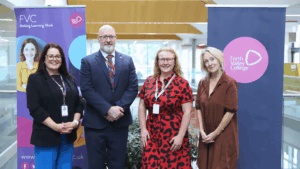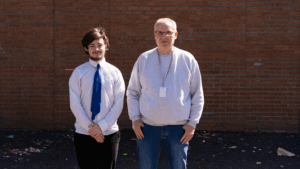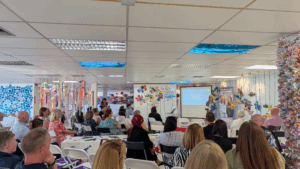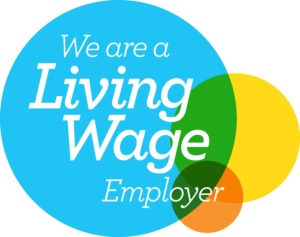#FutureOfScotland
The Times has launched its #FutureOfScotland project: creating a national conversation around how Scotland can unlock its full potential. It’s also inviting business, education and other leaders from across the country to offer their ideas on how the nation “can thrive in adversity”.
The first stage of the project was delivered this week in Glasgow, a city which The Times Editor Magnus Llewellin says “cannot realise its full potential without addressing the poverty and inequality that have blighted its prospects for generations”.
Iain MacRitchie was asked to give his views, drawing on his experience in setting up and running MCR Pathways.
MCR puts our city’s most disadvantaged at the very centre of our programme. Our mentors and partners are transforming the education outcomes of Glasgow’s care experienced young people for the better. Ensuring an equality of career opportunities and life chances, relative to any other young person in the city.
We know that People Make Glasgow, and our mentors and partners have the Inspiring City award to prove it! In MCR’s feature in the paper’s #FutureOfScotland supplement, writer Susan Dalgety also cites people as “Glasgow’s most valuable resource.”
Here’s Susan’s piece:
Just as people make Glasgow, so poverty and deprivation define the city, and the statistics are as stark as they are stubborn. Almost half of Glasgow’s residents (283,000 people) live
in some of the most deprived areas in Scotland, and more than a third of all children in the city are classed as living in poverty. In some of the city’s neighbourhoods, more than 45 per cent of children live in poverty.
This epidemic of deprivation is a powerful brake on Glasgow’s stated ambition to be the most productive city in the UK by 2023. Worse, it destroys thousands of lives every year. Life expectancy for a Glasgow man is nearly seven years below the national average.
However, one Glaswegian has decided that it doesn’t need to be this way. The entrepreneur Iain MacRitchie believes the cycle of poverty that has trapped generations in ill health and hopelessness can be broken, and that the city can be transformed.
Bridge from Poverty to Opportunity
For the past eight years, first in a part-time role, now full-time, his mission has been to change Glasgow through his charity, MCR Pathways, and its Glasgow Young Talent
mentoring programme for the city’s most vulnerable youngsters.
He wants to build a bridge — not over the River Clyde, but from poverty to opportunity.
Mr MacRitchie explains: “The best analogy I can use is two banks of a river. There are an increasing number of opportunities on one side of the river and there are large numbers of
communities and people on the other side with no means of crossing or belief that they can.
“Poverty limits choices, ones that we all take for granted. Lack of choice reduces hope, limits aspirations, kills confidence and with it, self-esteem. We should not then be surprised about the fundamental health and wellbeing impact that this creates.”
So far, so predictable. There have been countless poverty initiatives in Glasgow, each one promising to change the city for good, but none appears to have made a lasting difference.
Why is Mr MacRitchie so confident that his scheme, in partnership with Glasgow city council, will work where others have failed?
“I would not go as far as to say I have cracked it,” he says, “because that breeds complacency. I will apply a classic business principle here: as soon as you think you have made it, you have started your decline.
“But in practice, I think we understand what has created the poverty gap, and we have developed a very effective way of addressing it.”
 Download the PDF version of this article
Download the PDF version of this article
MCR Model
That way is deceptively simple. The MCR Pathways model is straightforward; on the surface anyway. The programme helps vulnerable youngsters aged 12 to 18, with a particular emphasis on those within or on the edges of the care system.
In the first two years of secondary school they take part in class-based work. MCR matches young people starting with a mentor for a minimum of a year and they participate in “talent tasters” for college, university, work experience, sport, art and culture.
The data is impressive. In the first ten schools where the scheme ran, the number of vulnerable youngsters going from school to work, college or university went from 48.4 per cent to 81 per cent.
The scheme has proven so successful that from January 2018 it will be in each of Glasgow’s 30 secondary schools.
Mr MacRitchie is quietly confident that he, and his partners, have found a way of breaking the poverty cycle.
“Policy-wise, we have got it. Do we have a magic bullet? We are probably close,” he says. “The currency of life expectations is educational outcomes. Full stop. They create the career choices, which in turn create life chances, and that is the same for everyone.

MCR CEO & Founder Iain MacRitchie
“We now have evidence from one, five, ten, fifteen schools, and we are about to see it across the city. It is really simple. We can have equality of opportunity for our young people.”
Liam’s story suggests that Mr MacRitchie may indeed have found that magic bullet, at least for this generation. Liam was a pupil at St Andrew’s Secondary School in Glasgow, where MCR Pathways ran for five years before Mr MacRitchie convinced the council to take it city-wide.
“When Liam arrived in the first year, he was at Primary 3 level,” explains MacRitchie.
“Previously he would never have caught up, but through Talent Tasters he found something he liked — trades and working with his hands.
“He found relevance to his education and with the support of his mentor, he got to university and a 2:1 degree. He is now a building surveyor — and also a mentor — and his two younger sisters have followed his path. But he is only one example; there are hundreds.”
Glasgow’s Present
Caroline Kennedy, from Parkhead in the East End of Glasgow, is one of the hundreds of volunteers who make communities such as Castlemilk and Easterhouse work, sometimes against almost insurmountable odds. A single parent, with two teenage sons, Ms Kennedy volunteers in her local church, is chairwoman of the Parkhead Youth Project and for two years was a member of the multifaith Poverty Truth Commission. In July she joined top poverty experts on the Scottish government’s new Poverty and Inequality Commission.
Ms Kennedy is very clear as to why her home city continues to suffer from disproportionately high levels of poverty. “When the shipyards and steel works closed down, many households were left unemployed, thrown out of a job for life, and there was no employment elsewhere.
Today, poverty is made worse by zero-hours contracts and benefit sanctions.” Her solution to ending poverty echoes that of Mr MacRitchie.
“If I was first minister, my priority would be more opportunities for young people leaving school,” she says.
“Apprenticeships are usually one to two years, with no guarantee of employment at the end. Young people are the future of Scotland, but because there is not enough full-time employment, it is not unusual for them to have to work two or three jobs to earn a
half-decent wage.”
Ms Kennedy is scathing of the most recent symbols of poverty — food banks. “I would like to see an end to food banks,” she says. “People are forced to use them because there is
no alternative, but they take away people’s dignity.
Mr MacRitchie is determined that his legacy will be that every Glaswegian will have the chance to do just that, and he is convinced the impact on the city’s economy will be transformational.
He says: “We are creating the conditions for the people of Glasgow to look after each other, to develop all the city’s talent. Once we have done that, then the city will explode with creativity and energy.”
Become a Mentor
Our expansion into all 30 Glasgow secondaries means we have many more inspiring young people asking for MCR’s help. They need mentors to make a huge difference to their confidence, educational outcomes and future life chances. Can you help them? Find out more about becoming a mentor.
Can your organisation help? To become involved in our Talent Taster programme, alongside our partners, simply GET INVOLVED!! We can’t wait to work with you to offer our city’s most needy a gateway to an expanding menu of opportunities and tasters of university, college and employment.
We’re always looking for new mentors to reach all the new young people who are coming on board with the programme. Help us spread the word by letting your friends and family know how worthwhile mentoring can be!






